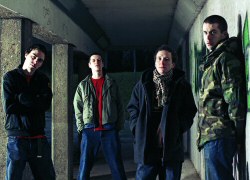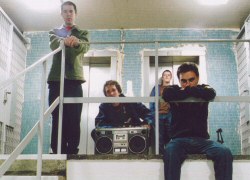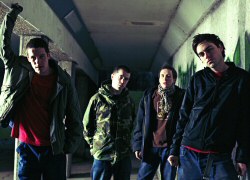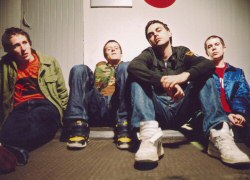Interviews Home / Music Home / Bullz-Eye Home

Interview with
Richard Archer
Reviewed by David Medsker
()
Date: 07/30/2005
Hard-Fi are four skints (their word, not ours) from a neighborhood in Middlesex called Stains, of all things. Their songs are a little sleazy, a little sinister, and a lot catchy. The band they most resemble is the Clash, taking the reggae and disco bits of their catalog and blending it together to make something all their own. Their EP, Cash Machine, is great fun, and their Mercury Prize-nominated album, Stars of CCTV, will hit these shores next year. Bullz-Eye caught up with the band’s singer and chief songwriter Richard Archer, an extremely friendly but fast talking bloke on a bad cell phone, to find out how the US was treating them.
Bullz-Eye: So where are you right now?
Richard Archer: We’re currently in Tuscon, Arizona in the Congress Hotel.
BE: Is this your first time on the west coast?
RA: Yeah, it’s our first time really in the States. We came to the South by Southwest festival in Austin in March. But this is our first time touring.
BE: How are you liking it so far?
RA: It’s cool, every time we look out the window, it’s like a film set. It’s brilliant.
BE: I just saw you guys at Lollapalooza, so I wanted to ask you about that.
RA: It was cool. We were kind of in awe to do it, really, because as far as everyone (in England) is concerned, we’re a new band, and no one knows what’s going on with us. So to play (Lollapalooza), for us, is brilliant. Plus, it was in Chicago, a city I’ve always wanted to go to. So it was cool, it was a bit quiet when we were on, but it was more the fact of being there than anything else.
BE: There were still a lot of people trying to get inside when you were playing, which is why you played to a small crowd.
RA: Still, it was a privilege for us. No one really knows about us in the US at the moment, so it was great. Lollapalooza’s one of those festivals you read about back home, and you wish you could play there one day, and we did. So it was brilliant.
BE: Plus you had the four screaming groupies in the front row, you had to like that.
RA: Say again?
BE: Did you see the four screaming groupies in the front row?
RA: No, I guess I missed them.
BE: Your bass player eventually smiled back at them meekly, in a “Hi, don’t touch me” kind of way.
RA: He’s not our usual bass player. Our usual bass player (Kai Stephens) couldn’t make it out here. He was a naughty boy a long time ago, and still has to get his visa before he can come out here. So a guy who’s a friend of ours stood in for these shows.
BE: Wow. Well, he sure seemed like he knew the tunes.
RA: Yeah, he picked things up really quickly, and he’s done a great job.
BE: Did you catch any other bands at the show?
RA: Unfortunately, I would have loved to but… this tour’s been short and
kind of put on. But we did our show, we did some press interviews, and then he
got on our bus and headed straight out. We had another show that evening in
Chicago, in the Double Door.

BE: Oh yeah, I love that place.
RA: Yeah, we had to be there at 4:00 for a load-in. So we did our show, which was mid-day, half past 12, and we had to leave the venue straight away, and get to the Double Door, and put our stuff in and do a sound check. We didn’t actually get to see the other bands. I would have liked to see the Pixies, but we weren’t even able to see the Dead 60’s, who were immediately after us.
BE: I was going to ask you about the Dead 60’s. Are you friends with them?
RA: We weren’t, until we had done some dates with the Bravery, and they were in the middle slot. We were on first, then the Dead 60’s, and then the Bravery. And we’ve become friends. They’re nice guys. We had heard about them, a lot of people have compared us to them. The similar influences, that kind of thing.
BE: Their lead singer’s a dead ringer for Joe Jackson.
RA: (laughs) I’ll tell him you said that.
BE: I can’t be the first person who’s told him that. So that’s too bad, you didn’t get to see anybody (at Lollapalooza), like the Kaiser Chiefs, or…
RA: We actually toured with the Kaiser Chiefs in the UK, so we know what they’re about. I actually heard the Kaiser Chiefs (at Lollapalooza), because we were doing press bits and pieces while they were playing. It’s a shame, I mean, it’s really great to be here, but you don’t get to see a lot of where you’re at or the other bands, that kind of thing. We’re trying to come back in November. It’s all been play the gig, bus, play the gig, bus, play the gig, bus. We’ve been trying to fit in a lot in a short space of time.
BE: You may be shocked to hear this, but I actually left 20 minutes into the Pixies set, and I love those guys. But they didn’t talk to the audience at all.
RA: Really? Oh, no.
BE: They whipped through their songs, they sounded great, and I was utterly bored. But I’m an old geezer, so don’t listen to me.
RA: I’ve never seen them before, you see, so you think, they’re gonna be great, even if they’re a few years past their prime. I don’t know if they’re doing it for the money now or what. A friend of mine saw them in the UK and said they were great, that was about a year ago.
BE: Well, again, they sounded great. They know the tunes, and they played anything I could possibly have wanted to hear, but it was like someone was onstage playing their records.
RA: Wow, that’s a shame.
BE: I was reading your press sheet, you were talking about the great British bands, and let me tell you how pleased I was that you put Massive Attack up with the Stones and the Clash.
RA: Yeah, for us they’re like…I think a lot of people don’t do that because they’re not a traditional rock group. But they’re still, for me, very important, and very British as well in what they do.
BE: That’s true, although I have to ask: what did you think of their last album (100th Window)?
RA: Honestly, I saw them live a couple of times promoting it, but for me, my favorite is still Blue Lines, and I also love Protection. The last one, I found a little bit self-indulgent.
BE: Me too, that’s why I asked.
RA: Basically, it was like soundscape… the thing I’ve always loved about Massive is that they make these amazing, interesting grooves, and they put good songs in there as well. But the last one, yeah, was a bit self-indulgent, it didn’t do a lot for me. I’ve never been much into Mezzanine, but I know a lot of people who really get it. (Had I understood what he was saying at the time, I would have told him that I’m one of those people who really gets Mezzanine, too.)
BE: I wanted to ask about how the cover of “Seven Nation Army” came about.
RA: First of all, we think it’s a great track. It’s fantastic, really. We
were just doing a jam thing, playing it in rehearsal. I don’t know, I just
thought the bass line had a dubby feel to it, and thought it sounded really
cool. We originally did it for a radio station, Radio 1 in the UK, they wanted a
cover and we thought it’d be cool. And then we started playing it live, and it
started developing and changing every time. So A, we thought it was a cool tune.
B, we put our own spin on it, which I think is important when you do a cover.
We’re not arrogant enough to assume everyone’s gonna know our songs, especially
when you come to America. So it’s good to play a tune that people actually can
get into and know.

BE: You’re playing a gig (Friday, July 29) in San Diego (San Diego Street
Fest), right?
RA: Yeah.
BE: The White Stripes are on that bill.
RA: Oh, cool.
BE: Have you heard anything from their camp? Has Jack White given you the thumbs up?
RA: I heard that they liked it. I mean, we had to ask for permission to do it, and no one said no. (laughs) I know they’re quite funny about people doing versions of their songs, which is funny, considering how many versions of other people’s songs they do. I’m not sure what our set time is tomorrow. If we only have a half hour, we may have to drop it (from the set).
BE: What’s it going to be like when Robbie Williams winds up covering one of your songs?
RA: Ahhhh, well, as long as he doesn’t do a Vegas version of it. That’s gonna be weird.
BE: You know it’s going to happen, though. He’s probably already working on a version of “Cash Machine.”
RA: Right now, as we speak? Trying to resurrect his career, well, I don’t want to say resurrect it, but…that would be kind of weird actually, that would be a very strange thing, hearing someone else play one of our songs. Though it would mean that you’ve made it, you’ve obviously reached a certain level. I wouldn’t want to slag him off, but if he does a good job, hey, good luck with it.
BE: Plus, it would probably make you a ton of money. You can’t argue with that.
RA: It would be pretty hard though, with one of our songs out there, and someone murdering it.
BE: So you guys are nominated for the Mercury Prize. How does that feel?
RA: Yeah, we didn’t realize that our album was out in time (for inclusion), so we were totally surprised. That album was made for 300 pounds, which is like 500 dollars. And we recorded it, mixed it, and put it out ourselves on a very small label. The guy that put it out, he had to use the last of his savings to put it out. And then, the fact that that record becomes one of the Mercury albums, up against Coldplay, whose album probably cost hundreds of thousands of pounds, it’s totally mind blowing for us. We’re really excited. I’m still surprised that anyone found the record. It’s a real vindication that people are connecting to what we’re doing and responding to it. So to get it on that list, with all those other bands, and there are some great records on there, we can’t quite believe it, actually. Especially since we’ve been in the US since the news came out and our friends are saying “You’re in the top ten, oh, you’re in the news.” And we’ve missed all that, so it’s still a bit surreal.
BE: There seems to be an outburst of-
RA: (Recorded message) The number you are trying to reach is not in service. Please hang up and try again.
BE: Oh, man!
Karli Stein (Publicist who set up the call): Uh oh. Let me try giving you
a call back.
(A minute passes) David, are you there?
BE: Yep.
KS: And Richard?
RA: Hello, there. David, sorry about that.
BE: No worries. I’m sure you have a ton of these to do, so I won’t keep you too much longer. But I wanted to ask you a handful of rapid fire questions: Who’s the best band in England right now?
RA: The best band in England right now? Can I say Hard-Fi?
BE: No. Obviously you guys are the best band in England. Who’s the second best band in England?
RA: I tell you what, the one we listen to right now for us is Gorillaz. They’re making crazy music.
BE: I’m actually surprised at how successful that (album) is, because it’s so unlike everything else out there that… Americans tend to like their music to be easy to digest.
RA: Yeah. Is it right that Gorillaz have done better than Blur in the US?
BE: Yeah, they’re absolutely bigger than Blur ever was here.
RA: It’s crazy, because you wouldn’t expect it in your life, it’s so eclectic and all over the shop. But that record is what we’ve been listening to on the tour bus a lot.
BE: Who would you like to work with?
RA: Hmmmm. Well, again, it would probably be Damon (Albarn, singer for both Gorillaz and Blur), I suppose, because of what they’re doing at the moment. We have similar roots in our sound. He also came down to our studio. We also had Mick Jones of the Clash come down. That was really cool, seeing that he was really into it.
BE: I’d like to see the Chemical Brothers take a whack at one of your
singles.

RA: Yeah, that would be pretty cool as well. I was more of a fan of their
earlier stuff more than their later stuff, but that track they did, what was it
called, “Push the Button”?
BE: Oh, “Galvanize”?
RA: That’s a real return to form, that one. Is it Q-Tip on that track?
BE: Yes.
RA: I love the string bit on that track, it’s really clever.
BE: Well, that’s all the questions I have. Is there anything we didn’t get to that you’d like to cover?
RA: No, we covered a lot of stuff. For Hard-Fi, and being in the States, one of the things we’ve been really pleased about is the reactions at the shows, and especially the shows in the Midwest, like Kansas, and then in Denver, people have been really keen to what we’re doing, and they love the EP. Some people have said to us before, "how do you think you’re going to go down in the US," since we’re a very quite English band. It’s one of the things we talk about, coming from a small town with nothing to do, and you can’t get out. Where you’re heartbroken, or you’ve lost your job, those basic things, I think someone from any town and any country can relate to.
BE: It also helps that it hasn’t been cool to be British in America for a long time. And right now, there’s just a flood of great bands coming from the UK.
RA: Timing is everything, isn’t it? I’ve always been proud of the music we make, but I never thought that…in the UK, we were never the hip band, we’re not like Bloc Party. So yeah, hopefully the timing’s right for us at the moment, we can make some headway.
BE: When is the album coming out in the States?
RA: I think it was going to be the fall, but now I think it’s going to be the new year. I think they’re worried about it getting crushed in all the Christmas flood of Mariah Careys and what have you. I think we’re going to try and get it out very early next year. It feels like a bit of a long time for me, but we’re going to be back in November for some more dates, and we hope to have another record, some kind of EP ready.
BE: That was my next question; when are you guys going to start working on new material?
RA: Um, I don’t know, because one thing I’ve discovered from touring is that it’s very hard to find a minute for yourself. I’ve got quite a few songs, and a lot of them weren’t finished when we made the first album. There’s some good stuff, so we’re going to go and cherry pick the best ones, work them out, work them over. We’re still quite new to the whole touring thing, so once we get our heads around that, we can start finding some time on the road to actually write some new material. Also, on the road is the best way to try out a new song. But for the moment, we’re just trying to concentrate on this album, and we’ll cross the bridge on the next one when we come to it. But we’ve got a lot of new material, so we’re confident that we can keep the momentum up.
BE: I’m surprised to hear that you’re still getting used to the touring thing, because I thought you kicked ass when I saw you.
RA: Well, this tour is the first tour we’ve done where we actually had to sleep on a bus. The other times, in the UK, we stayed in a motel, so the whole structure of your day, I’m just now getting used to that whole thing. The one thing we did do is we worked really, really hard in rehearsal. We didn’t want to come out here and hone our sound on the road. We really tried to get our stuff down as much as possible before we started playing. And in America, we’ve been playing with Mick, who’s a stand-in bass player. Hopefully, in November, you’ll see Kai, and with Kai, it’s another level. Mick is great, he’s a great player and he does really well. But Kai, Kai is our Paul Simonon. When we come back in November, I would urge you to come see us again, because you’ll be, “Oh, my God, that guy is a superstar.”
BE: I look forward to it. And hopefully, you’ll have more than 300 pounds to make your next record.
RA: That’s true, that’s true. But you know, maybe we’ll have a thousand.
BE: I will say, though, the record doesn’t sound cheap. It doesn’t sound lo-fi, it sounds like every other major label band.
RA: We didn’t want it to be lo-fi, we wanted to make it sound as good as we could. At the end of the day, sometimes the cash limitations make you more creative. You don’t need to have thousands of boxes to try out, you just make the one you’ve got work somehow. But we didn’t always know what we were doing, but we just worked it until we got it right. And when we were mixing it, instead of mixing it in a studio with posh speakers, we mixed it the way you’d listen to it: in the car. In the bathroom. In the bedroom. In the lounge. If it sounds good in those places, on a stereo at my place, where people are going to listen to it…
BE: That’s very smart. Sometimes you’ll pull those things out of the studio and they sound completely different, and in all the wrong ways.
RA: Yeah. Well, I think even when you’re in a pro studio, you take it away, and you mix it the way you’re going to hear the record.
You can follow us on Twitter and Facebook for content updates. Also, sign up for our email list for weekly updates and check us out on Google+ as well.












